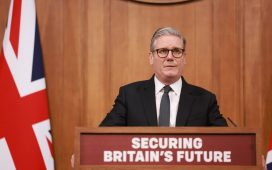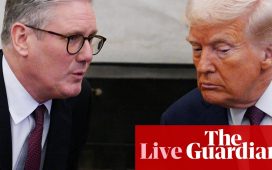 EPA-EFE/REX/Shutterstock
EPA-EFE/REX/ShutterstockRishi Sunak will remain Conservative leader until his successor is announced on 2 November, following the party’s worst general election defeat in its parliamentary history.
Here, we look at those who have thrown their hat into the ring in the Tory leadership election – and some of those who still might.
Kemi Badenoch
 PA Media
PA MediaThe ex-business secretary is seen as a frontrunner among the right of her party and has consistently attracted high approval ratings from party members in surveys conducted by Conservative Home, a popular website among activists.
Speaking at her count on election night, the North West Essex MP said the Conservatives had lost the public’s trust and the party had “some uncomfortable questions” to address.
The 44-year-old Brexiteer previously ran for Conservative leader following the resignation of Boris Johnson and came fourth despite starting the race with a relatively low-profile.
It is arguably through her other former role – as minister for women and equalities – that she has emerged as a darling of the modern Conservative right for her stance on trans rights.
While she has yet to announce her candidacy, she has already accused others of deploying “dirty tricks” against her.
Suella Braverman
 Getty Images
Getty ImagesThe 44-year-old MP has not ruled out a leadership run, but told GB News reflecting on what caused the Tory election defeat was a more urgent task than electing a new leader.
Ms Braverman had a spectacular exit from government in late 2023, when she was sacked as home secretary after accusing the police of political bias over pro-Palestinian marches.
She continued to hit the headlines over the demonstrations, describing them as “hate marches”, and claiming that Islamists and extremists were “in charge now”.
It was the second time she had left that role, following her resignation in October 2022 after sending an official document from her personal email.
After leaving office she fired semi-regular broadsides at Mr Sunak’s record on migration, and rebelled over his blueprint to implement the now-failed Rwanda deportation scheme, a programme she once described as her “dream” to deliver.
She stood in the 2022 leadership contest to replace Mr Johnson, but was eliminated in the second round of voting among Tory MPs.
At her count on election night, she said “sorry” on behalf of her party for “not listening” to the public, saying the Tories “did not keep our promises”.
James Cleverly
 Getty Images
Getty ImagesThe MP for Braintree was the first to declare his intention to stand as a candidate.
Announcing his decision in the Telegraph, he wrote that he could “unite” the party and “overturn Starmer’s loveless landslide”.
James Cleverly has been an MP since 2015 and served in the cabinets of Boris Johnson, Liz Truss and Sunak, becoming the first black foreign secretary.
The 54-year-old then succeeded Suella Braverman as home secretary during Rishi Sunak’s cabinet reshuffle in November 2023.
He has attracted criticism for some gaffes, including telling LGBT footballs fans to be respectful at the Qatar World Cup, denied making derogatory comments about Stockton-on-Tees in the Commons, and apologised for joking about spiking his wife’s drink at a Downing Street reception.
Robert Jenrick
 Getty Images
Getty ImagesRobert Jenrick, 42, became the third person to announce his candidacy – promising to win back Reform UK voters who deserted the Conservatives in the general election.
He previously said the Tories suffered a “devastating” defeat because the party failed to deliver on its promises to the public.
Before announcing his candidacy, he told the BBC’s Sunday with Laura Kuenssberg programme: “The first step for the party is to have a proper honest diagnosis about what’s gone wrong.”
Once seen as a centrist figure and close ally of Mr Sunak, Mr Jenrick has since moved to the right.
Last year he resigned his role as immigration minister, saying the government’s emergency Rwanda legislation did not go far enough.
That year he also made headlines for ordering that murals of cartoon characters at a reception centre for child asylum seekers in Dover be painted over.
He became MP for Newark in 2014 and served as housing secretary under Boris Johnson.
Priti Patel
 Getty Images
Getty ImagesFormer Home Secretary Dame Priti Patel, 52, has thrown her hat in the ring to be the next Tory leader.
Dame Priti wrote on X: “We must unite to win!
“I can lead us in opposition and unite our party and get us match fit for the next election, with unity, experience and strength.”
She became MP in 2010 and served as international development secretary under Theresa May, but quit amid controversy over unauthorised meetings with Israeli officials.
As home secretary under Boris Johnson, she launched the points-based immigration system, sealed returns deals with Albania and Serbia, and signed the original controversial deal with Rwanda to send asylum seekers to the country.
Her time in office was also met with criticism, including getting involved in a row with England footballers over taking the knee, and an inquiry finding her to have broken rules on minsters’ behaviour – she strongly denied bullying allegations.
She resigned as as home secretary when Liz Truss became Tory leader.
Mel Stride

Shadow work and pensions secretary Mel Stride, 62, is running to be party leader, pitching himself as a unifier who will “forensically” hold Labour to account.
A close ally of Mr Sunak, Mr Stride was one of a handful of ministers trusted to do media interviews during the recent election campaign.
After narrowly holding on to his Central Devon seat by 61 votes at the election, Mr Stride said his party needed to “think long and deeply” about its poor performance before it could become the “natural party of government” again
Launching his leadership bid, Mr Stride said his party needed to “build trust with the electorate again”.
Mr Stride has cited his roles as Treasury Select Committee chair and Commons leader as proof of his ability to command “respect” across the party.
Tom Tugendhat
 Getty Images
Getty ImagesFormer security minister Tom Tugendhat confirmed his candidacy, telling the Telegraph his party needed to “win back the trust of the British people”.
Setting out his stall, he accused his party of “failing to deliver” on its promises because “factional fighting was more important”.
The Tonbridge MP, 51, previously lost a leadership race against Liz Truss, during which he pitched himself as offering a “fresh start” and to “bridge the Brexit divide”.
The former Army officer is seen as being a centrist, which could prove a problem with more right-leaning party members.
Mr Tugendhat voted Remain during the Brexit referendum. He was highly critical of the Nato withdrawal from Afghanistan in August 2021.












